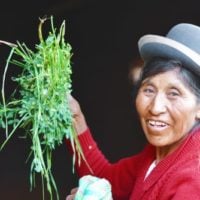Deadline: 24-Jan-24
L’Initiative, a funding mechanism implemented by Expertise France, is pleased to announce a call for proposals that focus on operational research around strengthening pandemic responses relating to children.
Aims
- This call for proposals aims to support the emergence of innovative research that improves access to health services and quality of life for children exposed to pandemics, based on the following priorities:
- Links between malnutrition and pandemics: Malnourished children, especially those with severe acute malnutrition, are at higher risk of becoming infected with HIV, TB and malaria. Conversely, infectious diseases often impact negatively on the nutritional status of children. Submitted projects might either assess malnutrition prevention and management strategies aimed at improving prevention and comprehensive care for the three pandemics, or assess screening methods, and then link to case management as appropriate, specifically focusing on malnourished children.
- Integration of prevention and screening methods: points of contact with the healthcare system are key opportunities to offer screening, or care as relevant, for the three diseases. Proposals may therefore relate to screening methods that use specific algorithms to integrate screening for children most exposed to pandemics. SMC cycles could also provide an opportunity to diagnose other diseases, as well as vaccination campaigns, etc.
- Improved adherence: adherence to ARV and TB treatment for HIV-positive and/or TB-infected children, as well as adherence to preventive treatments for malaria and TB, remain important issues. This call for proposals encourages new approaches to be developed to support care and prevention.
- Mitigating barriers to health system access: children rely almost entirely on those around them to be able to access the health system. Carrying out a focused assessment of the barriers to accessing health, including factors related to age, gender and other social determinants of health, could inform interesting approaches to improve the prevention and management of the three pandemics.
- Taking into account children with multiple vulnerabilities: children affected by migration, orphans, street children, and children facing serious crises (wars, natural disasters, etc.) have specific vulnerabilities that it is crucial to respond to in terms of health services and public health.
- Inclusion of children exposed to pandemics, who are not infected: When children are exposed to HIV (and ARVs), malaria and tuberculosis in the womb, this has an impact on the health of newborns. Children born to women infected by HIV, malaria and TB are more likely to be premature and have a low birth weight. It is now well documented that during the first years of life, children who have been exposed to HIV have a higher risk of hospitalization and mortality than unexposed children and several studies have shown that they have stunted growth and lower neurocognitive development than unexposed children.
Objectives
- Generally speaking, operational research (OR) has the following objectives:
- To improve the quality and performance of programs using scientifically valid methods.
- To assess the feasibility, efficiency and impact of new approaches or interventions with the population.
- To generate, gather and analyze the data necessary to develop public health recommendations on the use of a given intervention.
- In all cases, the capacity to carry out OR projects must take into account the broader context of countries that may lack resources as well as the technical structures to carry out a concerted research approach, or develop requests for OR support in the context of a Global Fund grant (including mechanisms to consult and coordinate with the scientific community to identify research priorities).
Focus Areas
- L’Initiative also encourages project leads to include the following topics as cross-cutting focus areas:
- Children’s mental health: the mental health of children affected by highly stigmatized diseases, such as HIV and TB, has received too little attention and needs to be included in OR programs, to then be included in all programs, for children adolescents and themselves.
- Pain management: this has been a blind spot for many patients and is all the more so for children. Indeed, when children complain or cry it is often considered “natural” and normalized, but pain management should be integrated into standard and innovative prevention and/or disease management methods for HIV, tuberculosis and malaria.
- Involving children in program development: this calls for proposals encourages the assessment of approaches developed in collaboration with children who are infected or affected.
- Human resources for health (HRH): as there are even greater shortages of HRH in relation to children, they encourage applicants to explore ways and approaches to increase skilled human resources to ensure the prevention and care of children in relation to pandemics.
Funding Information
- The total requested grant amount must cover at least 50% of the project budget and be between €650,000 and €3,500,000.
- Project duration must be between 36 and 48 months.
Eligibility Criteria
- The project lead applicant must be legally registered and have a board of directors/management committee and a registered headquarters in an eligible country or in France. International organizations, with the exception of regional non-state organizations, may not be the lead applicant or an implementing partner of projects. However, they can be associated stakeholders that do not receive any delegated budget.
- The lead applicant must have been legally registered for at least 3 years at the time of project submission.
- Lead applicants and implementing partners must not have any statutory provisions that prevent Expertise France, or any external auditor appointed by Expertise France, to carry out on-the-spot checks and inspections and have relevant rights to access the project sites and premises where the project will be carried out, including access to all documents and electronic data relating to the technical and financial management of the project.
- “Implementing partners” that are involved in the design and implementation of the project must receive sub-granting from the lead applicant.
- Organizations can be implementing partners, even if their board /steering committee and head office are registered in a non-eligible country. This is on the condition that there is proven and robust collaboration with the lead applicant and that the budget delegated to them/their partners does not exceed in total 15% of the grant from Expertise France, regardless of the number of implementing partners registered in a non-eligible country.
- The lead applicant must have sufficient management capacity to manage the requested budget.
- Co-financing is required for a minimum of 10% of the total intervention budget if the lead applicant’s annual expenditure is more than 5 million Euros.
For more information, visit L’Initiative.







































